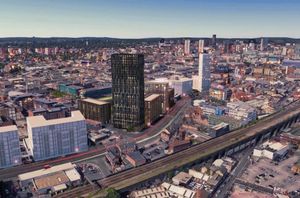Campaign against 30-storey Digbeth tower
Plans for a 30-storey tower development in Digbeth will ‘cast a dark’ cloud over the area and drive out its creative talent, warn campaigners who are trying to stop it happening.

Traders and residents based in and around the Custard Factory are lobbying against Court Collaboration’s planning application for the Stone Yard.
The mixed-use scheme, which would be built on the Bull Ring Trading Estate site opposite, features a number of buildings ranging from six to 30 storeys in height, providing 928 homes and nearly 11,000 square foot of flexible amenity, retail or leisure space.
Hundreds of people have backed the ‘Digbeth Deserves Better’ campaign which launched after the plans were lodged in September, with little to no consultation with those based in the area they claimed. The group argues the sheer scale of Stone Yard, particularly its tallest tower, will overshadow and dwarf iconic buildings such as Devonshire House, the 651-year-old Old Crown pub as well as the entire Digbeth conservation area.
They also claimed the plans are ‘poorly’ designed, lack affordable housing and parking whilst there is widespread concern that the developers have not properly considered Digbeth’s popular night-time venues.
But the campaigners are keen to stress that they welcome the idea of residential development on the site to drive footfall and help sustain Digbeth, providing it is of appropriate design and scale.





